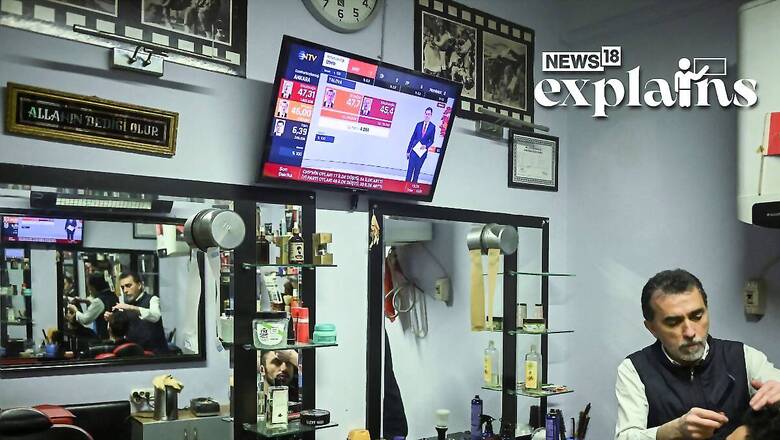
views
Turkey’s presidential elections appeared headed for a runoff Monday, with President Recep Tayyip Erdogan pulling ahead of his chief challenger, but falling short of an outright victory that would extend his increasingly authoritarian rule into a third decade.
The vote was being closely watched to see if the strategically located NATO country — which has a coast on the Black Sea to the north, and neighbors Iran, Iraq and Syria to the south — remains under the president’s firm grip or can embark on a more democratic course envisioned by his main rival, Kemal Kilicdaroglu.
While Erdogan has been in power for 20 years, opinion polls had shown that his reign may be coming to an end due to economic turbulence, a cost-of-living issue, and criticism of the government’s response to the February earthquake that killed more than 50,000 people.
Western nations and foreign investors were particularly interested in the outcome because to Erdogan’s unconventional economic leadership and often temperamental but effective efforts to place Turkey at the centre of international negotiations, including in Ukraine.
With almost all ballots counted on Monday morning, Erdogan led with 49.42 percent of the vote to Kilicdaroglu’s 44.95 percent, according to official figures provided by state news agency Anadolu.
A nationalist third candidate, Sinan Ogan, emerged as the kingmaker after picking up five percent, but has yet to come out for either frontrunner. Erdogan’s Islamic-rooted Justice and Development Party (AKP) and its far-right allies were also close to an outright majority in Sunday’s parliamentary elections.
The lira fell against the euro as traders digested with apprehension the increased likelihood of Erdogan’s unconventional economic policies continuing.
Why is Turkey Result Important to the Rest of the World?
Turkey is important to the world because of its location as well as its role as a strong economic and military power. Turkey is bordered by Syria and Iran, divided from Russia and Ukraine by the Black Sea, and surrounded by the Mediterranean and Aegean Seas. It controls the Bosphorus Strait, which is the sole way for Russia and Ukraine, among other countries, to access the Mediterranean Sea and hence the majority of the world by sea, as per a report by Indian Express.
Turkey is unique in that it possesses territories in both Asia and Europe. It is a NATO member with the second-largest standing army in the world, yet Erdogan is friendly with Russian President Vladimir Putin. Turkey is a buffer between the West and the upheaval in the Middle East, absorbing refugees and providing as a military base when necessary, as well as an ally because it is a stable democracy in an uncertain region.
Democracy is eroding under Erdogan, as per the report. and relations with the United States and the European Union are deteriorating. However, he remains an important collaborator, with the Russia-Ukraine conflict and his access to Putin adding to his clout.
The Russia Factor
Russia, too, has a lot riding on the outcome of the election, as per a report by New York Times. Turkey has been Russia’s crucial commercial partner and, at times, diplomatic middleman under Erdogan, a connection that has grown even more important for the Kremlin since the invasion of Ukraine.
Erdogan has followed a nonaligned foreign strategy that has frequently angered his purported Western partners while providing a welcome diplomatic opportunity for Moscow — maybe never more so than following Russia’s invasion of Ukraine, the report argues. Erdogan has hampered efforts to isolate the Kremlin and deprive it of finances to fund the war by refusing to execute Western sanctions against Moscow. At the same time, the faltering Turkish economy has recently feasted on substantially discounted Russian oil, aiding Erdogan’s bid for a third five-year term.
Erdogan has annoyed his friends even more by obstructing Sweden’s NATO membership quest, demanding that Stockholm first turn over scores of Kurdish refugees in the country, particularly from the Kurdistan Workers’ Party, which both Ankara and Washington consider a terrorist organisation.
Of course, NATO hopes that a change in leadership in Turkey will end the deadlock over Sweden’s membership in the military alliance, hopefully before the July summit in Vilnius, Lithuania.
Erdogan’s march towards authoritarianism, ties to Russian President Vladimir V. Putin, and disagreements with NATO have irritated officials in Washington, prompting some members of Congress to demand that Turkey be expelled from the NATO alliance.
New York Times, Associated Press contributed to this report

















Comments
0 comment